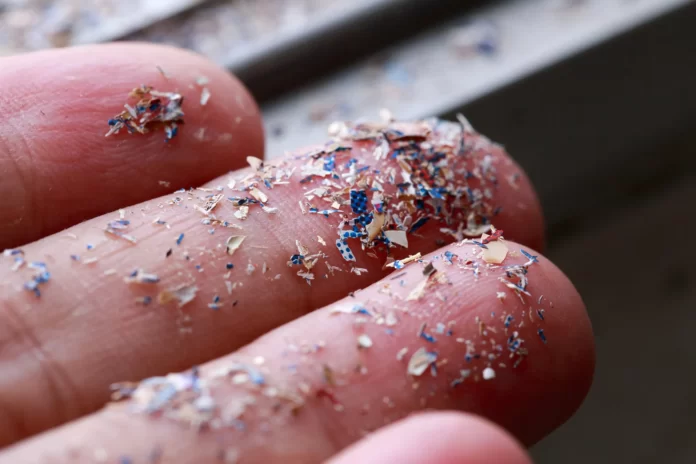A study has revealed a disconcerting reality: Americans are unwittingly consuming a credit card’s worth of plastic particles every week. This eye-opening discovery sheds light on the pervasive presence of microplastics in various aspects of daily life, from food and water to the air we breathe.
Conducted by researchers at the University of Newcastle in Australia, the study sought to quantify the extent of microplastic ingestion by individuals. The findings indicate that, on average, Americans are ingesting approximately 5 grams of plastic particles each week, equivalent to the weight of a standard credit card.
Microplastics, tiny particles measuring less than five millimeters, have infiltrated the food chain at an alarming rate. These particles result from the breakdown of larger plastic items, such as packaging and bottles, and are also present in products like personal care items and textiles. The study underscores the ubiquity of microplastics and their ability to infiltrate various sources of human consumption.
The research employed a conservative estimate, focusing primarily on the most common sources of plastic ingestion, namely water, seafood, salt, and air. The team analyzed existing data on microplastic consumption, incorporating factors such as beverage and food consumption patterns, to arrive at their conclusions.
Water, a fundamental element of daily life, emerged as a major contributor to microplastic intake. Plastic contamination in water sources, including rivers and oceans, translates to microplastics finding their way into drinking water. Seafood, another staple in American diets, is also a significant source, with plastic particles accumulating in marine life and subsequently entering the human food chain.
Even seemingly innocuous items like table salt were found to contain microplastics, further emphasizing the widespread nature of plastic contamination. The study’s findings underscore the need for heightened awareness about the potential health implications of consistent exposure to microplastics.
The health effects of consuming microplastics remain a subject of ongoing research, but concerns are mounting. While the particles themselves may not pose an immediate threat, there is apprehension about the potential absorption of chemical additives from plastics, which could have long-term health implications.
The study’s revelations are particularly relevant as governments and industries grapple with the challenges of plastic pollution. Efforts to reduce single-use plastics and enhance recycling initiatives gain added urgency in light of these findings. The impact of plastic pollution extends beyond environmental concerns, affecting human health in ways that are only beginning to be understood.
Addressing this issue requires a multifaceted approach, encompassing not only better waste management practices but also a reevaluation of how products are manufactured and consumed. Innovations in packaging, the development of alternative materials, and a collective commitment to reducing plastic use are essential components of a comprehensive solution.
The study serves as a wake-up call, urging individuals, industries, and policymakers to take proactive steps in curbing plastic pollution. From rethinking daily consumption habits to advocating for systemic changes, there is a collective responsibility to mitigate the pervasive presence of microplastics in our environment and, subsequently, in our bodies.
The implications of the study extend beyond individual habits to encompass broader environmental and policy considerations. Microplastics not only affect human health but also contribute significantly to ecological degradation. Marine life, in particular, faces severe consequences as these particles infiltrate aquatic ecosystems. The interconnectedness of ecosystems means that plastic pollution has far-reaching effects, disrupting the delicate balance of nature.

As the world grapples with the consequences of excessive plastic consumption, there is an increasing emphasis on reevaluating global waste management practices. Initiatives to reduce single-use plastics, promote recycling, and invest in sustainable alternatives are gaining traction. The study’s findings provide additional ammunition for advocates of stricter regulations and policies to limit plastic production and encourage responsible disposal.
Educational campaigns play a crucial role in this endeavor, raising awareness about the pervasive presence of microplastics and their potential impact on human health and the environment. By fostering a better understanding of the sources and consequences of plastic pollution, these campaigns empower individuals to make informed choices and demand accountability from industries and policymakers.
In response to the study, there has been a growing push for innovation in materials and packaging. Researchers and companies are exploring alternative materials that are less harmful to the environment and human health. Biodegradable and compostable options are gaining traction, offering a potential shift away from traditional plastics.

The study serves as a stark reminder that the consequences of plastic pollution are not confined to distant oceans or faraway lands but are present in our daily lives. The choices individuals make about the products they buy, the materials they use, and their waste disposal habits collectively contribute to the broader narrative of environmental sustainability.
Government intervention and industry collaboration are integral components of any comprehensive solution to the plastic pollution crisis. Policymakers are under increasing pressure to enact legislation that curtails excessive plastic production, encourages recycling, and holds industries accountable for their environmental impact. The study’s findings add urgency to these calls for action, emphasizing the need for swift and decisive measures.



